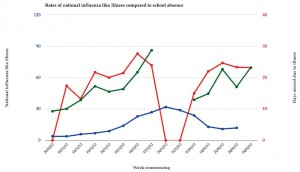Sometimes we hear the term ‘anecdotal evidence’ which is ‘evidence’ based on individuals’ own views and experiences. Is it really evidence? No – have a think about why.
The reason I bring it up is that over the week or so before half term I noticed what I thought was a big increase in the number of students off sick. I also noticed quite a few soldiering on in school with runny noses and tired faces. It felt like an outbreak and I diligently washed my hands as often as possible (teachers always get ill at the start of holidays, or is that just anecdotal evidence too?!).
But was this evidence of a flu outbreak? Almost certainly not. Although there were several absences, I couldn’t say for sure how many days students were off for and a genuine case of flu would result in several days from school. Perhaps it was just coincidence that alot of my students were off sick and this wasn’t the case in other classes? In fact when I look at our school data, although there was an increase in absences due to illnesses, it was less than the number reported before the Christmas holidays and was also decreasing slightly just before this half term.
So this highlights the importance of carefully collecting data in order to answer scientific questions and not to rely on people’s opnions. On the other hand, in an investigation such as this the experiences and information from students and staff in schools can help shed light on patterns in the absence data which could not be done by the scientists alone.




One Response to Anecdotal evidence